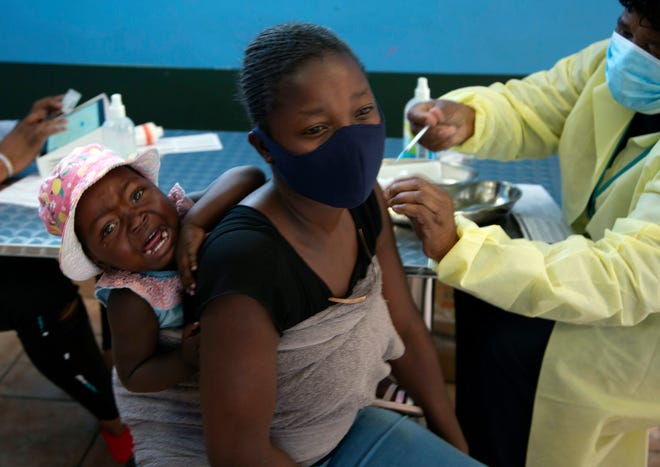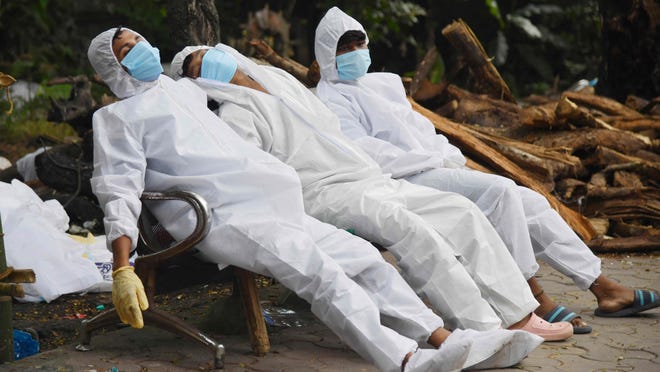
Experts with the World Health Organization were meeting Friday to assess a COVID-19 variant in South Africa that has been rapidly spreading among young people and has already spawned numerous mutations.
Meanwhile, Dr. Anthony Fauci, President Joe Biden's chief medical adviser, said American officials will have a call with South African officials Friday to find out more about the variant. He added there was no indication the variant had arrived in the U.S. yet.
It's too early to say whether the new variant, dubbed B.1.1.529, is going to have the potential impact of the troublesome delta variant. But the WHO will decide soon whether to give the latest variant a name from the Greek alphabet, one of the first indicators that it is worth consideration as an increased threat.
Scientists have little information about the variant and its potential for danger right now, said Dr. Maria Van Kerkhove, the World Health Organization's COVID-19 technical lead, on Thursday.
"What we do know is that this variant has a large number of mutations, and the concern is that when you have so many mutations it can have an impact on how the virus behaves," said Van Kerkhove.
The coronavirus evolves as it spreads and many new variants, including those with worrying mutations, often just die out. Scientists monitor for possible changes that could be more transmissible or deadly, but sorting out whether new variants will have a public health impact can take time.
The variant would likely be named nu — the next available letter in the Greek naming system for coronavirus variants — if it is flagged by the WHO group.
Researchers want to measure the variant’s potential to spread globally, possibly sparking new waves of infection or exacerbating ongoing rises being driven by delta, South African health experts said.
The new variant has also been found in Botswana and Hong Kong in travelers from South Africa, according to Joe Phaahla, the nation's health minister. Phaahla said the variant has seen rapid spread in Gauteng, the country’s most populous province.
“We’re flying at warp speed,” Penny Moore, a virologist at the University of Witwatersrand in Johannesburg, told the science journal Nature. Moore's lab is gauging the variant’s potential to dodge immunity from vaccines and previous infections.

Several nations, including Germany, Italy, the United Kingdom, the Netherlands, the Czech Republic and Japan, have responded to news of the variant by moving Friday to restrict air travel from several southern African countries. The European Union, which is made up of 27 nations, is also recommending a ban on flights from southern African countries, despite WHO officials warning against rash decisions.
Dr. Michael Ryan, the head of emergencies at the WHO said "it’s really important that there are no knee-jerk responses." And the Africa Centers for Disease Control and Prevention said in a statement it "strongly discourages" such travel bans, adding that "over the duration of this pandemic, we have observed that imposing bans on travelers from countries where a new variant is reported has not yielded a meaningful outcome."
More about the newly discovered variant:What to know about the new COVID-19 variant in South Africa
Also in the news:
►Israel announced Friday it detected the country's first case of the newly discovered variant in a traveler returning from Malawi. The traveler and two other people who are suspected to be infected with the variant have been placed in isolation.
►Amid news of the newly discovered variant, S&P futures were down 1.67% and Dow futures were 2.2% lower, forecasting a bad trading day before U.S. financial markets opened on Friday.
►Officials in the United Kingdom announced that six African countries will be added to England's travel "red list." Meanwhile, on Friday several European Union nations were moving to stop air travel from southern Africa to counter the spread of the new COVID-19 variant.
►Beginning Monday, Massachusetts hospitals will have to cut back on non-urgent scheduled procedures due to staffing shortages and longer patient stays, according to the state’s health authorities.
►The number of air travelers this week is expected to approach or even exceed pre-pandemic levels, and auto club AAA predicts 48.3 million people will travel at least 50 miles from home over the holiday period.
📈Today's numbers: The U.S. has recorded more than 48 million confirmed COVID-19 cases and more than 775,000 deaths, according to Johns Hopkins University data. Global totals: Nearly 260 million cases and more than 5.1 million deaths. More than 196 million Americans — roughly 59.1% of the population — are fully vaccinated, according to the CDC.
Keep refreshing this page for the latest news. Want more? Sign up for USA TODAY's Coronavirus Watch free newsletter to receive updates directly to your inbox and join our Facebook group.
Macy’s Thanksgiving parade returns, with all the trimmings
Giant balloons once again wafted through miles of Manhattan, wrangled by costumed handlers. High school and college marching bands from around the country were back, and so were the crowds at the Macy’s Thanksgiving Day Parade.
After being crimped by the coronavirus pandemic last year, the holiday tradition returned in full Thursday, though with precautions.
“It really made Thanksgiving feel very festive and full of life,” Sierra Guardiola, a 23-year-old interior design firm assistant, said after watching the spectacle in a turkey-shaped hat.
Thousands of marchers, hundreds of clowns, dozens of balloons and floats – and, of course, Santa Claus – marked the latest U.S. holiday event to make a comeback as vaccines, familiarity and sheer frustration made officials and some of the public more comfortable with big gatherings amid the ongoing pandemic.
— Cydney Henderson

COVID-19 cases are rising again this holiday season
Despite early signs that suggested the U.S. may have avoided another winter surge, COVID-19 cases are on the way up.
The country reported 665,420 cases in the week ending Monday, more than a 30% increase from the pace of cases reported about a month ago, according to a USA TODAY analysis of Johns Hopkins data.
As cases rise in 39 states, U.S. Health and Human Services data show hospitals in 32 states admitted more patients in the latest week than the week before.
“Quite frankly, I’m really concerned,” said Danielle Ompad, associate professor of epidemiology at New York University’s School of Global Public Health. “I would say we are better off than we were last year, but cases are starting to tick up and that is something that we really need to keep an eye on." Read more here.
— Adrianna Rodriguez
Will pandemic-weary shoppers turn out in full force for the holidays?
Buoyed by solid hiring, healthy pay gains and substantial savings, shoppers are returning to stores and splurging on all types of items.
But the big question is: How much will supply shortages, higher prices and staffing issues dampen their mood this holiday season?
Americans, already fatigued with pandemic-induced social distancing policies, may get grumpy if they can’t check off items on their holiday wish lists, or they may feel disappointed by the skimpy holiday discounts. Exacerbating their foul moods is the fact that many frustrated workers called it quits ahead of the holidays, leaving businesses short-handed during their busiest time of the year.
Shoppers are expected to pay on average of between 5% to 17% more for toys, clothing, appliances, TVs and others purchases on Black Friday this year compared with last year, according to Aurelien Duthoit, senior sector advisor at Allianz Research. TVs will see the highest price spikes on average, up 17% from a year ago, according to the research firm. That’s because whatever discounts available will be applied to goods that are already expensive.
Such frustrations could mute sales for the holiday season that are supposed to break records.
— Associated Press
Contributing: Associated Press
Source link









